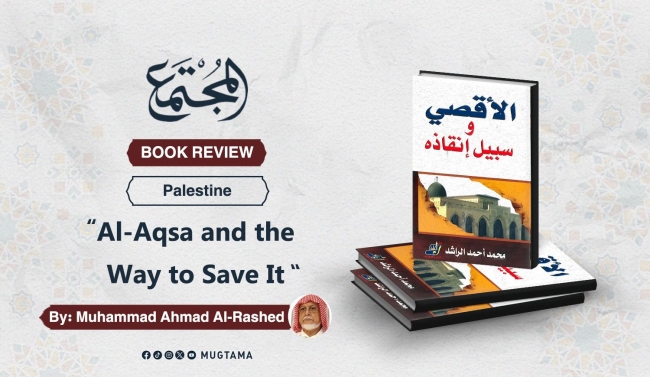Book Review of “Al-Aqsa and the Way to Save It"... By: Muhammad Ahmad Al-Rashed
The book entitled "Al-Aqsa and the Way to Save It" by Mr. Muhammad Ahmad Al-Rashed presents a comprehensive vision of the position of Islamic law towards the work of the Islamic Resistance Movement (Hamas) and an accurate jurisprudential analysis of the issue of settlement with the Zionist enemy.
It sheds light on the legal foundations that justify the establishment of "Hamas". It confirms the hypothesis of jihad in Islam, reviewing the jurisprudential conditions related to peace with the enemy according to what the jurists have decided.
The book is an explicit call for Muslims to have a deeper understanding of the concept of jihad and its legitimacy, and a call to interact with the Palestinian issue from a clear legal perspective that reinforces the necessity of resistance and adherence to the land and holy sites.
Al-Rashed confirms several main axes in his book:
First: The obligation to jihad
The author begins by reviewing the legal evidence for the obligation of jihad, based on the Qur’anic verses and the Prophetic hadiths that urge fighting for the sake of Allah, most notably the Almighty’s saying: "And fight in the way of Allah those who fight you but do not transgress. Indeed, Allah does not like transgressors" (Al-Baqarah: 190). He explains that all Islamic sects agree on the obligation of jihad and that this obligation is dropped from everyone if a group of Muslims performs it. He also discusses that the establishment of the "Hamas" movement comes within the framework of renewing this obligation and the legal commitment to defending the holy places.
Second: Conditions for peace with the enemy
The book comprehensively discusses the ruling on peace with the enemy, stressing that peace with the enemy must be according to specific conditions, not permanent, but temporary in a manner consistent with the public interest. Al-Rashed points out that current attempts at settlement with the Zionist entity do not adhere to these controls, which makes them subject to doubt and rejection from a legal perspective.
Third: The necessity of jihad and resistance
The book stresses the necessity of continuing jihad and resistance against the "Israeli" occupation, considering that the "Hamas" movement represents a fundamental pillar in this jihad.
He believes that "Hamas" plays a major role in reviving the meaning of jihad in the souls of Muslims and works to remind the nation of the importance of defending its sanctities and reclaiming its rights.
Fourth: The rights of Muslims and the duty of defense
The book discusses the Palestinian issue from a legal and political perspective, stressing that jihad is the legitimate means to restore stolen rights and preserve the Islamic identity. The author believes that the Zionist occupation always seeks to expand at the expense of Islamic lands; imposing on Muslims the duty of defense and resistance.
Fifth: Legal perspective
The book is not limited to the legal approach only, but also addresses the international legal dimension, indicating that the United Nations Charter recognizes states' right to defend themselves, confirming that self-defense is a legitimate right according to international law, and highlighting this aspect to confirm that the Palestinian resistance, represented by the Hamas movement, is a legitimate and legal jihad as well.
Sixth: The role of Hamas in reviving jihad
Al-Rashed devotes part of the book to highlighting the importance of Hamas in reviving Islamic jihad, considering that it is not just a military resistance movement, but rather part of the ongoing Islamic jihad process throughout history, emphasizing the importance of supporting this movement to complete its role in confronting the enemy.
Reliable jurisprudential sources:
Al-Rashed relied in his book on 3 main sources that reinforce his idea of jihad and resistance, which are:
1- "Jihad in the Path of God" by Dr. Abdullah Al-Qadri, a doctoral thesis discussing the provisions of jihad in Islamic law.
2- “Sharh Al-Seer” by Imam Muhammad bin Al-Hasan Al-Shaibani, a book of jurisprudence dedicated to the rulings of jihad, with an explanation by Shams Al-A’immah Al-Sarakhsi.
3- “The Effects of War in Islamic Jurisprudence” by Dr. Wahba Al-Zuhayli, dealing with the jurisprudential aspects related to war and defense.


